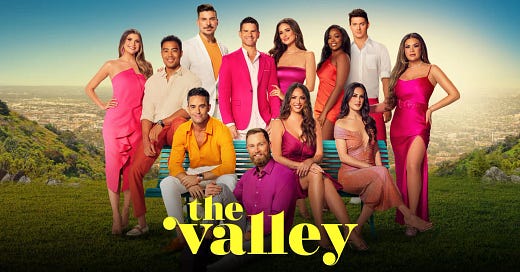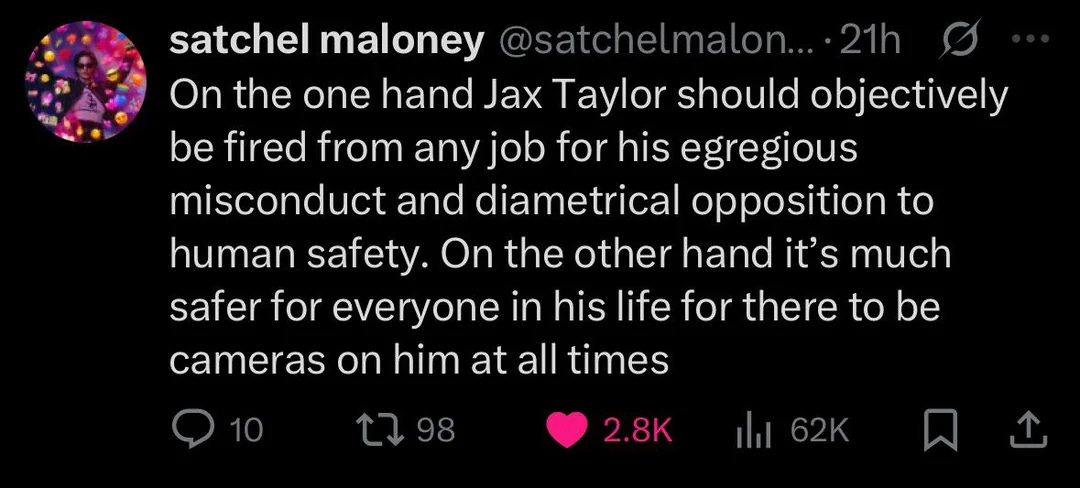Even the people who like The Valley do not like The Valley.
The show is a semi-spinoff of Vanderpump Rules that, in theory, follows five couples as they try to balance marriage, kids, and living life in sunny California. In practice, the show follows a group of emotionally stunted, rage-infused adults who make jabs at each other for drinking too much or losing millions of dollars or being unfit parents.
Reality TV, and Vanderpump Rules in particular, always appealed to our desire to gawk. The Valley feels different. There’s the voyeurism - watching Tom Sandoval beat up Jax Taylor because he slept with Tom’s girlfriend; and then there’s The Valley’s foray past voyeurism and into something nastier - watching Brittany Cartwright tell Jax Taylor she plans to file for full-custody of their toddler and slap him with a restraining order.
The standard, famously inverse formula for reality television is that the worse something is for the people involved, the better it is narratively. When Scandoval broke1, it was, I imagine, one of the worst moments of Ariana Madix’s life and also one of greatest moments in the history of the show’s decade-long run2. The level of misfortune The Valley is working feels much higher, and therefore much harder to justify enjoying. Viewers are saying things like “[m]ost of the men on this show are truly horrifying” or “I felt so bad for her that I had to keep pausing” or the most alarming, “Bravo is walking a tightrope right now between providing entertainment and simply airing domestic violence on TV.”
But we don’t stop watching.
The Valley knows that at least some of its appeal is schadenfreude, audience members tuning in and thinking, “Thank Christ I am not married to Jax Taylor.” Ethically, some scholars argue we can feel okay about enjoying others’ misfortune so long as we did not play an active role in causing the distress. In the case of reality television, I’m not quite sure the audience is entirely guilt-free. I know, for example, that Jesse and Michelle’s divorce would be less vicious had they never agreed to do a TV show. I know it would be better for Danny if footage of him being blackout drunk were not easily available and widely shared across the internet. I know that Jax Taylor – who admitted he’s addicted to his phone, to social media, to seeing what people say about him – would be much healthier if he stepped away from all that. The catch is that doing so would mean The Valley would cease to exist.
“Well, they signed up to be on a television show,” you might say. That’s true, it was a Faustian bargain, no one forced their hand. What’s also true is that years ago, when they thought doing a reality show would be a fun way to get some money and hang out with their friends, they likely could not imagine a world where they found themselves calling out their partner’s cocaine addiction on national television.
I’ve been thinking quite a bit about the role of the audience after seeing this tweet -
This presents the audience not as the gobblers of people's misery but as watchful eyes, as stalwarts of accountability. I don’t know if I fully buy into the theory that Jax Taylor is somehow on better behavior when there’s a camera in front of him, but I do find it interesting to imagine how the role of the audience then shifts. Our participation is actively changing the outcome of people’s lives not for the worse, as previously argued, but for the better. Part of that is true. I am fairly certain that Jax would have slept with Kristen regardless of whether he was on a TV show or not. I am less certain that Jax would have gone to rehab if there were not cameras around.
Reality TV fans are used to playing different roles at once because watching reality TV required selective ignorance. We pretend the camera isn’t there while knowing the presence of the camera is the basis for the show. We pretend conversations are organic and not producer-orchestrated. But there is one binary we can all agree which is that reality TV allows for no object permanence. If you are off-camera, you cease to exist, or as Roxana Hadadi phrased it in the wake of Scandoval, “the reality-TV formula deems honesty to be what is captured on camera and dishonesty to be what people claim happened off.” Honesty, however, can have negative connotations when it comes to The Valley. Some things are too honest, too raw, too salacious for even the most seasoned Bravo viewers. Dishonesty, and privacy, may be better for everyone. Well, everyone except the viewers.
Scandoval, for those unfamiliar with reality TV drama, was a seismic event where Ariana Madix discovered her partner of over a decade, Tom Sandoval, had been having a months-long affair with their mutual friend Rachel Leviss.
It also, significantly, got the show nominated for its first ever Emmy award.





Michelle!! I am so happy to see you in my inbox again. As an avid Bravo and reality tv watcher, I think about this a lot too, and yet here I am still tuning in every week...